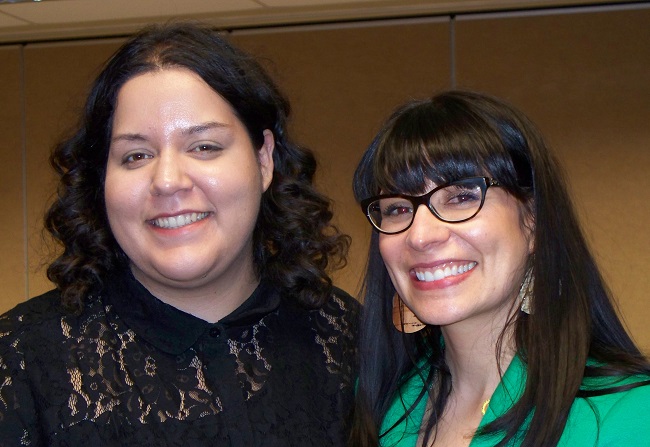Doctoral student guest speaker at Indigenous Leadership Speaker Series

By Shirley Honyust
LONDON, ON—Candace Brunette-Debassige, previously the Coordinator of Indigenous Services, was invited to speak on Indigenous Women, Leadership, and Education as part of the Indigenous Leadership Speaker Series.
Brunette-Debassige’s visit was sponsored by Indigenous Services (IS) and Dr. Susan Hill of First Nations Studies, and she was introduced by Zeeta Lazore, Academic Transitions Opportunities Assistant of Indigenous Services.
A Mushkego Iskew (Cree woman) originally from Fort Albany First Nation Treaty 9 territory, Candace is a long way from the small town of Cochrane in northern Ontario where she was born. During her early life, she faced family struggles and missed a lot of school, one year in particular she missed more than 100 days. She was not athletic, nor was she academically gifted, and she felt that she didn’t really belong, an attitude which she picked up from her mother’s own sense of not belonging. Finally, in college she was unsuccessful with her studies and did not pass, due to in part to the barriers she faced which included marginalization, discrimination, racism and ignorance. These same negative attitudes, however, fueled her desire to make school a better place of learning.
After completing an undergraduate degree in Aboriginal Studies and Master’s in Adult Education at University of Toronto, she came to Western as the Director of Indigenous Services in 2012. She is now a doctoral student in Western’s Faculty of Education completing her research on The Experiences of Indigenous Women Administrators Leading Indigenous Education Initiatives in Universities in Canada.
It is quite fitting that the day chosen for Brunette-Debassige to speak was also the International Day of Women. Her lecture filled in some of the gaps that leave Indigenous women wondering what it is that stands in their way of securing positions of leadership in a predominantly man’s world, both academically and culturally.
Her slide show begins with a story of a black car driving up to the house where her mother grew up with her mother and grandmother. The women knew why the black car came to their home: to collect the children living there and take them away from their families for the purpose of education in the residential schools built for this purpose. Fortunately, the children were well-hidden in a small room off the main part of the house, so they were not seized and forcibly taken to residential school in the black car.
Brunette-Debassige paid homage to her own role models in the community: Indigenous Women of the Longhouse, the Clanmothers; Chief Leslee White-eye of Chippewas of the Thames; Vivian Peters, the original Director of First Nations Services at Western; and Myrna Kicknosway, a visiting Elder to Indigenous Services.
What happens when you join the institution of education? For her, one of the issues was identity, as both sides struggled to be acknowledged. At first glance, her looks and bearing present her as being non-Indigenous despite her heritage definitely being Mushkego Cree. She saw her worlds colliding as the Euro-western based dominant hierarchal model clashed with Indigenous conceptions based on a heterarchical model which is more situational, connected to community needs, driven by individual passions, and persuasive techniques.
She described Indigenous women leaders as occupying the space on the borders, within the margins, the in-between spaces, and the challenges of creating change in a complex, multi-layered institutional system; change is needed at multiple levels, both internally and externally.
Some of the methods she uses to balance her life are described as finding synergism: sharing stories; Indigenous ways of knowing; vision; lifelong learning; and having boundaries. Another included finding sources of strength: engaging in ongoing reflexivity about co-option and power; developing relationships at work with Indigenous and non-Indigenous people who are allies; and to rethink the definition of power.
Her final slide was a picture of Indigenous Women in Leadership celebrating a moment together: Shannon Koostachin of Attawapiskat who led the movement for safe and comfortable schools, along with the four women credited with founding Idle No More: Jessica Gordon; Sylvia McAdam; Sheelah McLean; and Nina Wilson.
To further speak about the abovementioned issues, or to hear about her research, Candace Brunette-Debassige can be reached via e-mail at: cbrune2uwo.ca.

